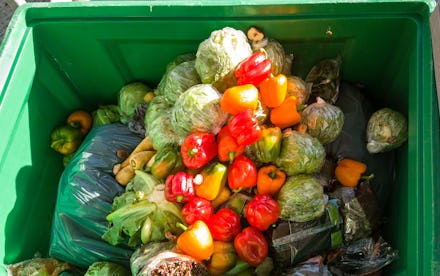Surprise: Rich people waste more food than everyone else

We might be going too easy on ourselves when it comes to the food waste we generate, and a team of Dutch scientists are calling us out. Researchers from Wageningen University & Research have published a study that suggests consumers are wasting twice as much food as initially estimated. They also found a link between affluence and food waste; the more money a person makes, the more food they tend to waste.
'Food waste' is defined as food that's perfectly fine for human consumption that goes uneaten and thrown out. In the past, the the UN Food and Agriculture Organization (FAO) has estimated that about one-third of all food produced goes to waste. The FAO came to this conclusion by looking at how much food is lost during production (i.e. 'ugly' vegetables that get rejected for sale) and how much is lost in the kitchen (buying too much food and not eating it before spoilage, for example). By looking at these sources of waste, the UN proposed that the average person tosses out 214 calories worth of food per day.
The new study focused solely on what happens to food when it reaches the consumer. Waste that's created through the production process wasn't analyzed. By analyzing consumer behavior and calculating numbers based on food data provided by the UN, the researchers reached a similar, but twice as worse, conclusion. They believe people are actually wasting 527 calories worth of food a day. This is a little more than twice as much as the UN's official estimate.
Additionally, the scientists' analysis found that a person with greater income tends to waste more food. As income grows higher than $6.70 per day, consumers are more willing to toss out perfectly good food. This indicates that people living in richer nations are likely producing the most waste. Although the study did not include food waste data from the U.S., an old estimate from the USDA puts Americans' amount of food waste at 30 to 40 percent — higher than the global average.
The lead author of the study, Monika van en Bos Verma, hopes these findings will be a "wake-up call" for people. Especially for people in richer nations like the U.S. "Food waste is a luxury when you're poor, it's not when you're richer," explained Van en Bos Verma to New Scientist. "The value of food, it goes down [as you get richer]. It's also availability: The more you have, the more you're likely to waste."
This is a problem, not only because this much food could have helped people struggling with food availability, but because it's bad for the environment as well. "If food waste were a country," wrote a reporter for Yale Climate Connections, "it would be the third-largest emitter of greenhouse gases behind China and the U.S., according to the World Resources Institute." The author goes on to note that "there are studies that indicate as much as 11 percent of greenhouse gas emissions could be eliminated if food waste were brought to zero."
The study from the Dutch researchers isn't perfect. They only looked at 67 percent of the global population, and didn't look at data from countries like the U.S., a nation already estimated to be a big food waster. Other analysts have been skeptical about the calculation method as well, since much of the information had to be inferred due to a lack of hard data from nations around the world.
But Van en Bos Verma's team still believes the findings are an important part of spreading awareness of food waste among affluent consumers. It also serves as a warning to the international community about a possible increase in food waste as poorer countries become more developed. With more education and continuing to foster cultural norms that encourage food-saving, Van en Bos Verma believes that increase could be avoided.
If you're looking to reduce food waste in your home, the U.S. Environmental Protection Agency recommends being mindful of what you regularly eat and creating a shopping list based on how many meals you will actually eat at home. If you have too many ingredients, try chopping and freezing some to prevent them from spoiling. Learn the difference between the "best by" and "sell by" dates to know when something will actually spoil. And, finally, be sure the finish your leftovers before you head out to shop.